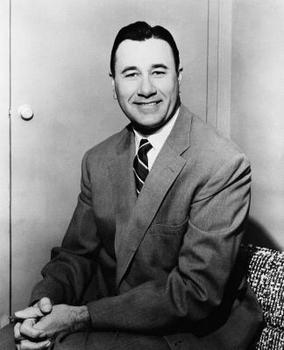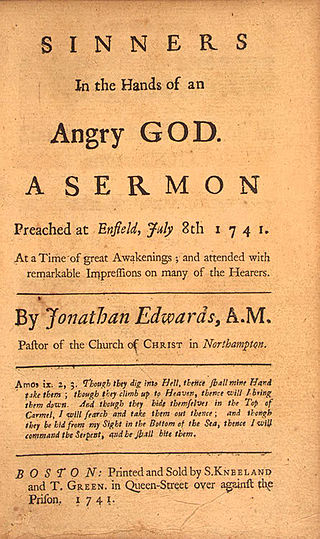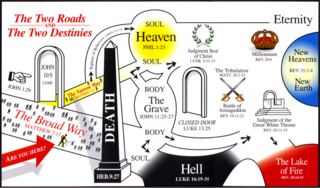Related Research Articles

Faith healing is the practice of prayer and gestures that are believed by some to elicit divine intervention in spiritual and physical healing, especially the Christian practice. Believers assert that the healing of disease and disability can be brought about by religious faith through prayer or other rituals that, according to adherents, can stimulate a divine presence and power. Religious belief in divine intervention does not depend on empirical evidence of an evidence-based outcome achieved via faith healing. Virtually all scientists and philosophers dismiss faith healing as pseudoscience.

Pentecostalism or classical Pentecostalism is a Protestant Charismatic Christian movement that emphasizes direct personal experience of God through baptism with the Holy Spirit. The term Pentecostal is derived from Pentecost, an event that commemorates the descent of the Holy Spirit upon the Apostles and other followers of Jesus Christ while they were in Jerusalem celebrating the Feast of Weeks, as described in the Acts of the Apostles.

James Warren Jones was an American preacher and political activist. He led the Peoples Temple, a new religious movement, between 1955 and 1978. In what he called "revolutionary suicide", Jones and the members of his inner circle orchestrated a mass murder–suicide in his remote jungle commune at Jonestown, Guyana, on November 18, 1978. Jones and the events which occurred at Jonestown have had a defining influence on society's perception of cults.

Granville Oral Roberts was an American Charismatic Christian televangelist, ordained in both the Pentecostal Holiness and United Methodist churches. He is considered one of the forerunners of the charismatic movement, and at the height of his career was one of the most recognized preachers in the US. He founded the Oral Roberts Evangelistic Association and Oral Roberts University.
The Azusa Street Revival was a historic series of revival meetings that took place in Los Angeles, California. It was led by William J. Seymour, an African-American preacher. The revival began on April 9, 1906, and continued until roughly 1915. On the night of April 9, 1906, Seymour and seven men were waiting on God on Bonnie Brae Street, "when suddenly, as though hit by a bolt of lightning, they were knocked from their chairs to the floor," and the other seven men began to speak in tongues and shout out loud praising God. The news quickly spread; the city was stirred; crowds gathered; services were moved outside to accommodate the crowds who came from all around; people fell down as they approached, and attributed it to God; people were baptized in the Holy Spirit and the sick were said to be healed. The testimony of those who attended the Azusa Street Revival was "I am saved, sanctified, and filled with the Holy Ghost" in reference to the three works of grace of Holiness Pentecostals, the original branch of Pentecostalism. To further accommodate the crowds, an old dilapidated, two-story frame building at 312 Azusa Street in the industrial section of the city was secured. This building, originally built for an African Methodist Episcopal (AME) church, had more recently been used as a livery stable, storage building and tenement house. In this humble Azusa Street mission, a continuous three-year revival occurred and became known around the world. Stanley H. Frodsham, in his book, With Signs Following, quotes an eye-witness description of the scene: The revival was characterized by spiritual experiences accompanied with testimonies of physical healing miracles, worship services, and speaking in tongues. The participants were criticized by some secular media and Christian theologians for behaviors considered to be outrageous and unorthodox, especially at the time. Today, the revival is considered by historians to be the primary catalyst for the spread of Pentecostalism in the 20th century.

The Church of God of Prophecy is a Holiness Pentecostal Christian church. It is one of five Church of God bodies headquartered in Cleveland, Tennessee, that arose from a small meeting of believers who gathered at the Holiness Church at Camp Creek near the Tennessee/North Carolina border on Saturday, June 13, 1903.
The Independent Assemblies of God International (IAOGI) is a pentecostal Christian association with roots in a revival of the 1890s among the Scandinavian Baptist and Pietist communities in the United States. Independent Assemblies of God International is a member of the Pentecostal Charismatic Churches of North America. International offices are located in Laguna Hills, California.
The Latter Rain, also known as the New Order or the New Order of the Latter Rain, was a post–World War II movement within Pentecostal Christianity which remains controversial. The movement saw itself as a continuation of the restorationism of early pentecostalism. The movement began with major revivals between 1948 and 1952, and became established as a large semi-organized movement by 1952 and continued into the 1960s. The movement had a profound impact on subsequent movements as its participants dispersed throughout the broader charismatic and pentecostal movements beginning in the 1960s.

William Marrion Branham was an American Christian minister and faith healer who initiated the post–World War II healing revival, and claimed to be a prophet with the anointing of Elijah, who had come to prelude Christ's second coming; some of his followers have been labeled a "doomsday cult". He is credited as "a principal architect of restorationist thought" for charismatics by some Christian historians, and has been called the "leading individual in the Second Wave of Pentecostalism." He made a lasting influence on televangelism and the modern charismatic movement, and his "stage presence remains a legend unparalleled in the history of the Charismatic movement". At the time they were held, his inter-denominational meetings were the largest religious meetings ever held in some American cities. Branham was the first American deliverance minister to successfully campaign in Europe; his ministry reached global audiences with major campaigns held in North America, Europe, Africa, and India.

The First Great Awakening or the Evangelical Revival was a series of Christian revivals that swept Britain and its thirteen North American colonies in the 1730s and 1740s. The revival movement permanently affected Protestantism as adherents strove to renew individual piety and religious devotion. The Great Awakening marked the emergence of Anglo-American evangelicalism as a trans-denominational movement within the Protestant churches. In the United States, the term Great Awakening is most often used, while in the United Kingdom the movement is referred to as the Evangelical Revival.

Charles F. Parham was an American preacher and evangelist. Together with William J. Seymour, Parham was one of the two central figures in the development and early spread of American Pentecostalism. It was Parham who associated glossolalia with the baptism in the Holy Spirit, a theological connection crucial to the emergence of Pentecostalism as a distinct movement. Parham was the first preacher to articulate Pentecostalism's distinctive doctrine of evidential tongues, and to expand the movement.
Word of Faith is a worldwide Christian movement which teaches that Christians can access the power of faith through speech. Its teachings are found on radio, the Internet, television, and in some Neo-charismatic churches and communities. Traditional Pentecostal churches cannot be categorized under this teaching. The movement teaches that the salvation won by Jesus on the cross included healing and wellbeing for believers, claiming support from scripture verses such as John 10:10, 1 Peter 2:24, and Romans 10:9-10.
Prosperity theology is a religious belief among some Protestant Christians that financial blessing and physical well-being are always the will of God for them, and that faith, positive speech, and donations to religious causes will increase one's material wealth. Material and especially financial success is seen as a sign of divine favor.
James Gordon Lindsay was a revivalist preacher, author, and founder of Christ for the Nations Institute. Born in Zion, Illinois, Lindsay's parents were disciples of John Alexander Dowie, the father of healing revivalism in America. After the family moved to Portland, Oregon, the young boy was influenced by John G. Lake and converted to Pentecostalism by Charles Fox Parham. At the age of eighteen he began his ministry as a traveling evangelist, conducting meetings in Assembly of God, British Israelite churches and other Pentecostal groups. By 1940 he was organizing large convention meetings, including the 1940 Anglo-Saxon World Federation meetings in Vancouver. In 1947 he began serving as campaign manager and publicist for William Branham, with whom he established Voice of Healing magazine in 1948. Lindsay gradually took over full management of the Voice of Healing association which helped launch and popularize the ministries of Oral Roberts, A. A. Allen, and dozens of other prominent evangelists. In 1971, Lindsay renamed the organization Christ For The Nations to reflect the growing missionary focus of the organization. He led the organization until his death.

The Apostolic Faith Mission of South Africa (AFM) is a classical Pentecostal Christian denomination in South Africa. With 1.2 million adherents, it is South Africa's largest Pentecostal church and the fifth largest religious grouping in South Africa representing 7.6 percent of the population. Dr. Isak Burger has led the AFM as president since 1996 when the white and black branches of the church were united. It is a member of the Apostolic Faith Mission International, a fellowship of 23 AFM national churches. It is also a member of the South African Council of Churches.

The Assemblies of God USA (AG), officially the General Council of the Assemblies of God, is a Pentecostal Christian denomination in the United States founded in 1914 during a meeting of white Pentecostal ministers at Hot Springs, Arkansas, separating from the historically black Church of God in Christ. The Assemblies of God is a Finished Work Pentecostal denomination and is the U.S. branch of the World Assemblies of God Fellowship, the world's largest Pentecostal body. With a constituency of over 3 million, the Assemblies of God was the ninth largest Christian denomination and the second largest Pentecostal denomination in the United States in 2011.

The Healing Revival is a term used by many American Charismatics in reference to a Christian revival movement that began in June 1946 and continued through the 1950s. The Healing Revival sparked the Latter Rain movement in 1948 and the two movements were interrelated. The period of revival was a significant influence on the modern charismatic movement.

The Gospel Halls are a group of independent Christian assemblies throughout the world that fellowship with each other through a set of shared Biblical doctrines and practices. Theologically, they are evangelical and dispensational. They are a conservative strand of the Open Brethren movement and tend to only collaborate with other assemblies when there is doctrinal agreement.
"Abundant life" is a term used to refer to Christian teachings on fullness of life. It is not an organized movement or a unique doctrine, but a name applied to the teachings and expectations of the groups and people who follow the teachings. Abundant life teachings may include expectations of prosperity and health, but may also include other forms of fullness of life when faced with adverse circumstances.
A revivalist is a person who holds, promotes, or presides over religious revivals. A secondary definition for revivalist is a person who revives customs, institutions, or ideas. The definition has become more robust in recent decades, and has been revised and adapted by American Charismatic and Pentecostal Christians to be someone who “recognizes that God’s manifest presence transforms lives and cultures.” A revivalist can also include someone that either presides over, or actively pursues, a religious re-awakening or restoration to spiritual ideas, orthodoxy, religious or personal experiences, and/or communal pursuit of divine occurrences.
References
- ↑ Ireland, Michael (October 19, 2018). "Healing Evangelist Franklin Hall Honoured". Assist News Service. Retrieved 2022-03-18.
- ↑ Harrell 1978, pp. 212–213.
- ↑ Harrell 1978, p. 251.